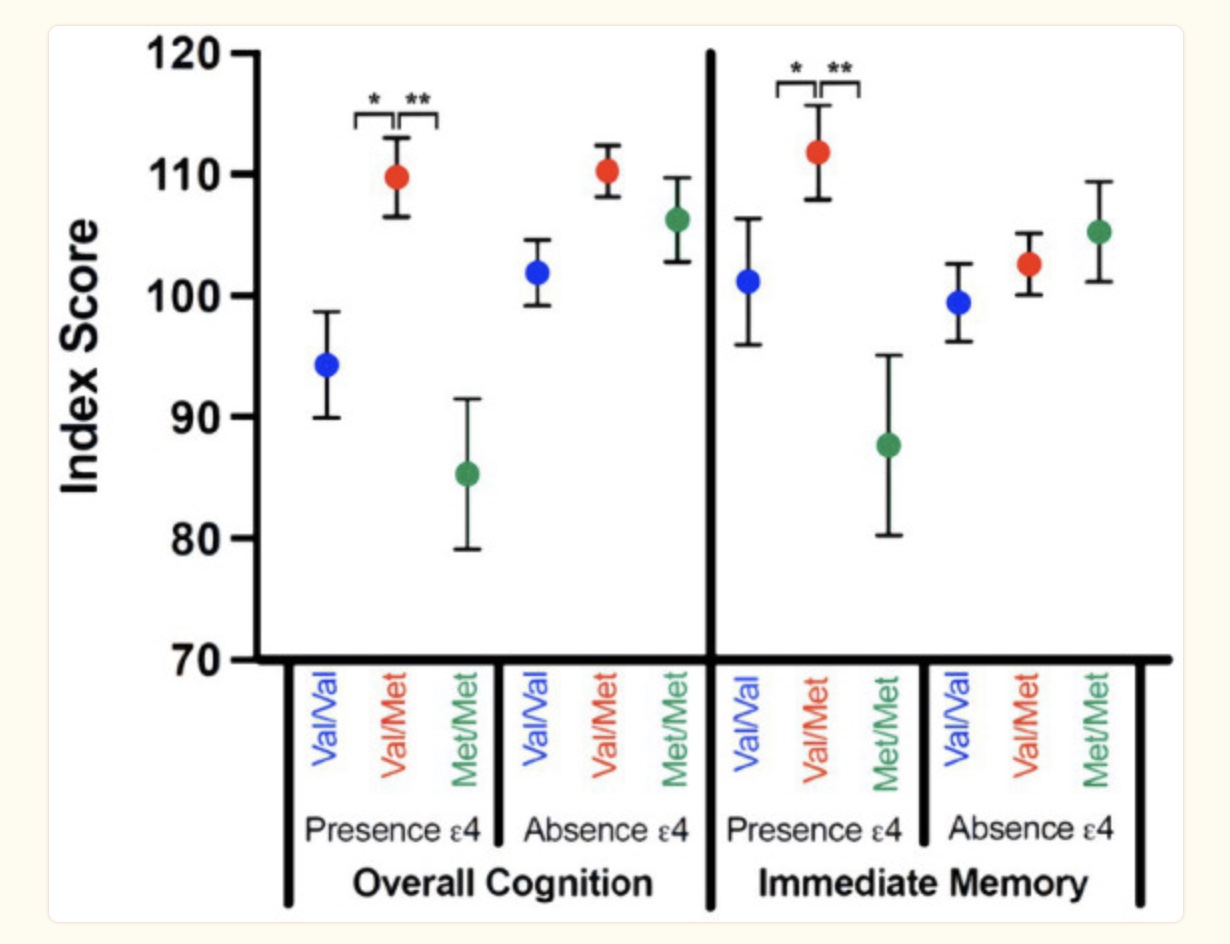For a long time, researchers focused on finding individual gene variants – SNPs – that were associated with traits or diseases. It was a one-to-one kind of relationship. Then came genome-wide association studies, which gave us multiple variants that had a tiny effect on a trait or disease.
More recently, researchers have focused more on the interactions between polymorphisms with known, high-impact functional changes.
Researching genetic connections in aging brain function
A new study of cognitive performance in aging looked at the interaction between two genes with known effects: APOE and COMT. [ref – open access study]
The APOE gene encodes a lipoprotein that plays a role in cholesterol transport and metabolism. Cholesterol is essential in the brain, and a variant in the APOE gene is one of the strongest common predictors of Alzheimer’s risk and cognitive impairment in aging. There are three common types of APOE, called E2, E3, and E4. Since you inherit one copy from each parent, you have six possible APOE types: E3/E3 (normal), E3/E4, E4/E4, E4/E3, E2/E3, and E2/E2 (rare). The E4 allele increases the risk of Alzheimer’s disease, with E4/E4 being associated with the highest rates of Alzheimer’s disease.
Related article: APOE and Alzheimer’s
The COMT gene codes for an enzyme that breaks down catecholamines, which is a class of molecules that includes several neurotransmitters. For example, COMT breaks down dopamine, and variants in the gene cause either slower or faster metabolism of dopamine.
Related article: COMT and Neurotransmitters
The COMT gene has a common variant called Val158Met or rs4680 that changes the stability of the enzyme. People with the low version of rs4680 (Met/Met) have about 40% lower COMT levels with reduced enzymatic activity compared to the Val/Val version.[ref]
COMT is thought to affect both cognition and motor function in aging through its effect on dopamine metabolism. Dopamine is important for memory and executive function, and it is also a critical component of motor function. For example, the loss of dopaminergic neurons causes the tremors and walking problems in Parkinson’s disease.
Terminology Time-out:
Heterozygous advantage describes a situation where the advantage (for whatever phenotype is being studied) is found in people with one copy of the typical allele and one copy of the variant.[ref] Genetic mutations occur all the time when genes are copied – including in the gametes that form the genes of the next generation. While the word “mutation” has a negative connotation, mutations can be harmful, beneficial, or completely neutral. Mutations that provide a survival advantage tend to be passed on to offspring (because the parent survived to pass on the mutation…). For example, mutations in the CFTR gene cause cystic fibrosis in people with two copies of the mutation. However, geneticists believe that the mutations are relatively common because being heterozygous for the mutation (having one copy) provides an advantage for surviving cholera outbreaks. Thus, it is a heterozygous survival advantage to have a CFTR mutation – in the presence of cholera.
Back to the study…
The COMT and APOE study included 89 healthy older adults (average age 72). The study participants underwent a battery of tests including working memory, verbal fluency, and motor function tests. They were also genotyped for APOE and COMT.[ref]
Results:
The results showed that in people with the APOE E4 allele, the COMT Val/Met heterozygous genotype had significantly better overall cognition and intermediate memory. This shows a heterozygous advantage for the intermediate COMT function. a In people without the APOE E4 allele, there was no statistically significant difference.

There were no differences in motor function between the APOE types or the COMT fast/slow genotypes.
The APOE E4 allele combined with heterozygous COMT conferred a significant advantage in cognition scores. A heterozygous advantage in COMT has also been shown in other studies, such as in kids with math anxiety or attachment personality.[ref][ref]
APOE and COMT Genotype Report
Heads up:
If you don’t want to know your APOE genotype and Alzheimer’s risk, please don’t read this section.
Lifehacks:
What can you do to improve your overall cognitive function?
You don’t have to just accept that your brain will start to decline as you get older. You can do a lot about it! Start with the basics of staying physically and socially active. Eating a healthy diet and avoiding processed foods will also improve your basic cognition.
Beyond the basics, here’s what research shows is likely to work to improve cognitive function as you age:
Sleep duration and sleep quality:
A good night’s sleep makes a big difference in cognitive function. A study of monozygotic twins found that sleep duration was important for “cognitive performance on four cognitive abilities (semantic fluency, spatial-visual reasoning, processing speed, and episodic memory). Other areas of cognition were not affected by short sleep.[ref]
Bright Light in the morning:
Light in the morning resets your circadian clock and stops melatonin production. Bright light therapy is effective in improving cognitive function in the elderly. Bright light at 2,500 – 4400 lux in the morning for one hour effectively increased cognitive function scores and reduced the use of certain medications[ref] Try getting outside first thing in the morning — go for a walk or drink your coffee on your deck, whatever works for you
Related article: Alzheimer’s and Light at Night
Fisetin:
A natural flavonoid, fisetin is a small molecule, which means it has a better chance of crossing the blood-brain barrier. Research on fisetin for cognitive dysfunction shows neuroprotective properties, including prevention of oxidative stress.[ref]
Related article: Fisetin
Luteolin:
A flavonoid found in fruits and vegetables, luteolin has a variety of anti-inflammatory and antibacterial properties, as well as being a mast cell stabilizer and neuroprotective. Studies show that luteolin may help with cognitive dysfunction caused by inflammation. Luteolin reduces the cytokines that cause inflammation in the brain.[ref][ref] Other research explains that luteolin may specifically help with “brain fog” by reducing neuroinflammation.[ref]
Related article: Luteolin
Lion’s mane mushroom extract:
Animal and cell studies clearly show the neuroprotective and cognitive benefits of Lion’s Mane Mushroom (Hericium erinaceus). Research suggests that it reduces activation of the NRLP3 inflammasome in an Alzheimer’s model and improves memory in human clinical trials.[ref][ref] Lion’s mane is available in capsules or as a powder, and you may be able to find the whole mushroom at some grocery stores.
Polyphenols:
A meta-analysis that combined data from 15 high-quality studies found that higher polyphenol consumption improved cognitive performance.[ref] Polyphenol supplements are available — or just eat a diet high in fruits and vegetables. For example, blueberries are high in polyphenols, and animal studies show that blueberries may increase neuroplasticity.[ref]
Related articles:
Alzheimer’s and Light at Night: Taking action to prevent this disease
https://longevitylifehacks.me/alzheimers-prevention-in-the-liver/

